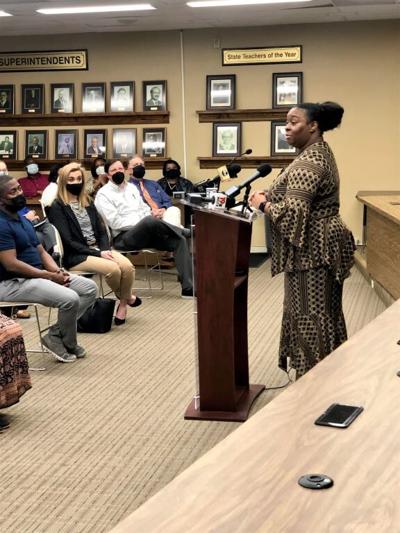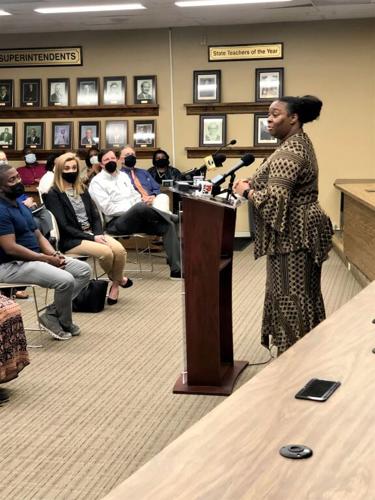COLUMBIA — Accusing the school system's critics, including her own colleagues, of spreading misinformation, Richland One School District's board chairwoman championed a proposal to dictate how fellow board members could speak with media during a fiery debate March 22.
In the wake of several Post and Courier stories digging into spending issues at Richland One, board Chairwoman Cheryl Harris erroneously insisted that fellow board members weren’t allowed to criticize her or other district leaders because their statements could be defamatory. The 10-year board veteran and Eastover native insisted the district's finances are sound.
During the board's three-hour meeting March 22, Harris successfully pushed for the initial approval of a policy that requires Richland One board members to specify in future media interviews that they are speaking only for themselves, not on behalf of the board.
The vote followed an intense debate in which Robert Lominack and Beatrice King, two board members who have been critical of the district’s management, insisted that attempting to mute criticism of the district would violate the First Amendment of the U.S. Constitution.
At various points in the debate, Harris made claims that revealed a misunderstanding of those federal free-speech rights.
“You can only speak about you,” Harris told Lominack at one point. “What you can say is, ‘I need to do a better job of having a discussion or I need to do this.’ But when you say, ‘The board needs to do a better job,’ well, that’s your opinion.”
“You cannot say ‘The board don’t this,’ ‘The board don’t that.’ ‘The board needs to this,’ ” Harris told Lominack at another point. “Because you cannot speak for the board’s performance. That’s not the role you play.”
In yet another exchange, Harris told Lominack, who was elected to the board in October 2021, “You can’t even criticize me to them (the media) because you don’t know me. You just got here.”
“I can criticize you,” Lominack insisted.
“No, you cannot criticize me,” Harris said.
“I can,” Lominack said.
“OK, well, do it,” Harris said.
The board debate came two days after The Post and Courier published a story about an internal investigation that alleged a former Richland One employee misspent tens of thousands of public dollars over the span of several months before he was caught. The story also referenced reports by a group of parents and the district’s own internal auditor that raised questions about how the district oversees hundreds of thousands of dollars in credit card spending by its employees.
The story quoted Lominack and King criticizing the district’s handling of its credit card program and Harris defending it. Another board member, vice chairwoman Angela Clyburn, declined to comment, referring questions to Harris.
Richland One is one of many boards across the state that — at the urging of the S.C. School Boards Association — has adopted policies designating the board’s chairperson as the board’s official spokesperson.
The association’s executive director, Scott Price, told The Post and Courier that policy is meant to “hopefully allow a board and a district to maintain a consistent message.”
But it does not — and cannot — bar individual school board members from speaking out against district actions or policies they disagree with, Price said.
Price declined to comment on Harris’ assertions at the March 22 meeting.
School board members and even local council members across South Carolina often refer to such policies in declining to comment on their actions and referring all media questions to their chairperson.
Free-speech advocates say such policies are unhelpful to the democratic process, which requires a free flow of ideas and information so voters can make informed decisions.
Bill Rogers, who recently retired as head of the S.C. Press Association, called the Richland One debate part of a “disturbing trend where these autocratic board members want to stifle any criticism.”
“Is this Russia?” he asked.
In nearby Lexington-Richland Five School District, a district leader has recently lashed out against critics with legal action.
Board vice chairman Ken Loveless filed two libel suits last week against constituents over Facebook comments that questioned his ethics and called him a "loser."
Harris insisted that the new Richland One media proposal was legally sound. She said the new policy wouldn’t stop board members from speaking to the press but said board members need to be clear that they are speaking for themselves only.
Harris said she had to put her foot down after seeing certain board members spread false statements to media outlets. She did not specify which statements she was referencing, or who made them. But such criticism could lead to defamation lawsuits against board members, Harris warned.
“I don’t have to accept when individuals put false narratives out here,” Harris said. “It’s a sad thing when we should be working to build the district, we put false narratives out here. We tell mistruths.”
Lominack and King were the only board members to vote against the measure.
Later in the meeting, Harris pushed back against criticism of the district’s financial oversight. She said The Post and Courier story highlighted how well Richland One’s internal auditor has worked to identify shortcomings and make improvements. She said Richland One has adopted the auditor’s recommendations and addressed any issues.
“We control our story,” Harris said.
Andrew Shain contributed to this report.











